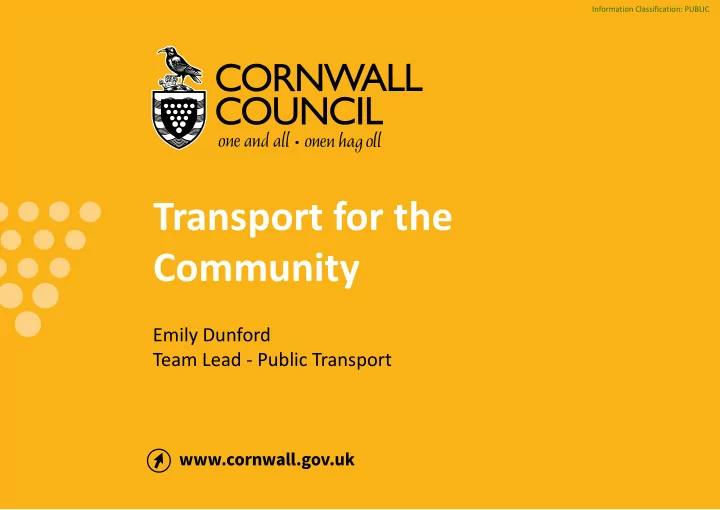

Information Classification: PUBLIC Transport for the Community Emily Dunford Team Lead - Public Transport
Information Classification: PUBLIC Overview • Introduction • Transport for the Community • Role of the Local Authority • What is Community Transport? • Starting a Scheme and Following Best Practice • The Future?
Information Classification: PUBLIC Transport for the Community • Transport takes many forms (Car, Cycling, Bus and Train) • Private transport (such as the car) makes up the primary mode of travel for most people • Bus travel is made up of • Commercially run bus routes (approximately 50% of the Cornwall Network) • Supported bus routes • Train travel is franchise based
Information Classification: PUBLIC Role of the Local Authority • To fill in the gaps in the bus network within a set budget • Currently around £7 million for bus services excluding bus passes • Grants for Community Transport • Provide information about Public Transport to the Community • Timetable (Printed and online) • Real Time Passenger Information • Roadside Infrastructure • Local Authority, Parish Council and Private Ownership • Maintenance • Local Transport Act 1978, Devolution Deal • One Public Transport for Cornwall • Two Trains per hour • Feeder Services
Information Classification: PUBLIC Transport Coordination Service Local Buses 6m journeys Special Needs Transport Truro Park & Ride £7m p.a. 2,000 students 1.5m journeys £6m p.a. £0.5m TCS Concessionary School/College Fares Transport Social Care 100,000 eligible Transport 12,000 students £6m p.a. 2,000 clients £9m p.a. £3m p.a.
Information Classification: PUBLIC OPTSfC Achievements to Date Contactless ticket machines Infrastructure & Increased Standards New & Upgrade Fleet Passenger Information & Systems
Information Classification: PUBLIC What is Community Transport • No set definition of Community Transport, though there are a regularly agreed principle of • Providing a service where no alternative is available (including Private Car) • There are different types: • Community Car • Shopmobility • Community Bus (Section 19 and Section 22) • Wheels to Work • Schemes can operate different rules for eligibility • Cornwall currently has a number of schemes providing services.
Information Classification: PUBLIC Starting a Scheme and Following Best Practice • Is there a defined need? Can it be evidenced? • Are there alternative transport solutions for the route(s) people need? • Is there a Community Transport group nearby who could expand? • Could provision be shared? • What solution is best for the Community? • Is the scheme sustainable? Funds, volunteers, awareness • Can best practice be followed? • DBS checks • MiDAS training • Safeguarding training • Record keeping
Information Classification: PUBLIC The Future? The Negatives • National volunteer driver shortages • D1 training issues • Stereotypes and stigmas to Community Transport The Positives • Autonomous Vehicles • Changing Service Delivery (closer to the individual) • Greater Integration of Transport
Information Classification: PUBLIC Thank you / Meur ras If you have any questions or comments transport@cornwall.gov.uk
Recommend
More recommend